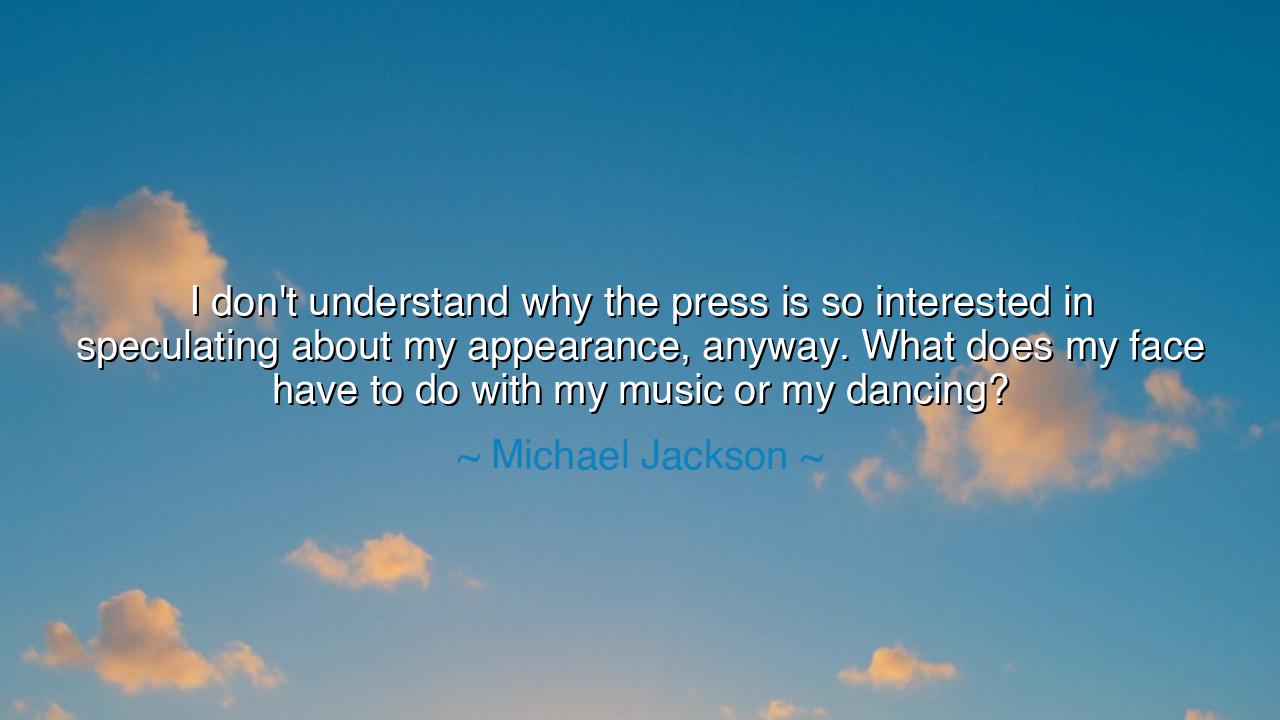
I don't understand why the press is so interested in speculating
I don't understand why the press is so interested in speculating about my appearance, anyway. What does my face have to do with my music or my dancing?






The words of Michael Jackson — “I don’t understand why the press is so interested in speculating about my appearance, anyway. What does my face have to do with my music or my dancing?” — are not merely the cry of a man under the gaze of the world, but a lament as old as fame itself. For in them, he asks a question that echoes through the corridors of time: why do mortals fix their eyes on the mask, when it is the spirit within that gives birth to greatness? His voice resounds like a prophet’s, reminding us that the vessel of flesh is but a shell, while the art — the music, the dance, the fire of the soul — is eternal.
In the days of the ancients, the poets and bards knew this truth well. When Homer sang of Achilles’ wrath, he did not pause to describe the warrior’s face in detail, for it mattered little. What mattered was the burning heart, the unyielding spirit, the deeds that thundered across the battlefield. Yet in later times, mankind grew enamored of surfaces, forgetting that the radiance of a person lies not in the shape of their visage, but in the greatness of their deeds. So too did Michael Jackson suffer this curse — the burden of eyes that looked only at skin, when his true gift was the transcendence of song and motion.
We must recall the story of Socrates, the philosopher of Athens. By all accounts, his appearance was plain, even mocked by some as ugly. Yet his words pierced the hearts of men, shaking cities and toppling false wisdom. His students did not follow him because of the shape of his face, but because of the brilliance of his thought. In the same way, Jackson calls us to remember that the essence of an artist lies not in outward form, but in the fire they share with the world.
The danger of judging by appearance is not only that it blinds us to true beauty, but that it enslaves the spirit. When a man or woman is measured only by the curve of their features, the light of their soul is neglected. Michael’s question — “What does my face have to do with my music or my dancing?” — is a challenge to the world, a plea for liberation from shallow chains. For his music carried millions, his dance shook generations, his art transformed the very fabric of culture. What need had the world of his face, when his work had already carved immortality into time?
Yet, even as he speaks, we see the tragic flaw of humanity: we hunger for spectacle, not essence. Like the Romans in their arenas, cheering not for virtue but for blood, so too did the press delight in speculation about his appearance, turning away from the symphony of his creation. In this we see a warning — that the crowd may often abandon wisdom in their thirst for distraction, and that the artist must stand firm, even when misunderstood.
The lesson, therefore, is one of vision. Judge not a person by what is seen, but by what is given. Seek not the mask, but the melody; not the face, but the flame. When you look upon others, search for their contribution, their love, their courage — for these are the marks of immortality. The shell will fade, but the spirit remains.
And so, let us act with clarity: when tempted to judge by appearances, pause and ask — what has this person created? What kindness have they offered? What truth have they spoken? In your own life, nurture not the vanity of outward form, but the strength of inner light. Build your art, your work, your relationships upon the foundation of authenticity. For as Jackson reminds us, the eternal legacy of a human being lies not in the mirror, but in the dance they leave behind.
Thus, to future generations, I say: let not the gaze of the world enslave your spirit. Remember always that the face is dust, but the art is eternal.






AAdministratorAdministrator
Welcome, honored guests. Please leave a comment, we will respond soon